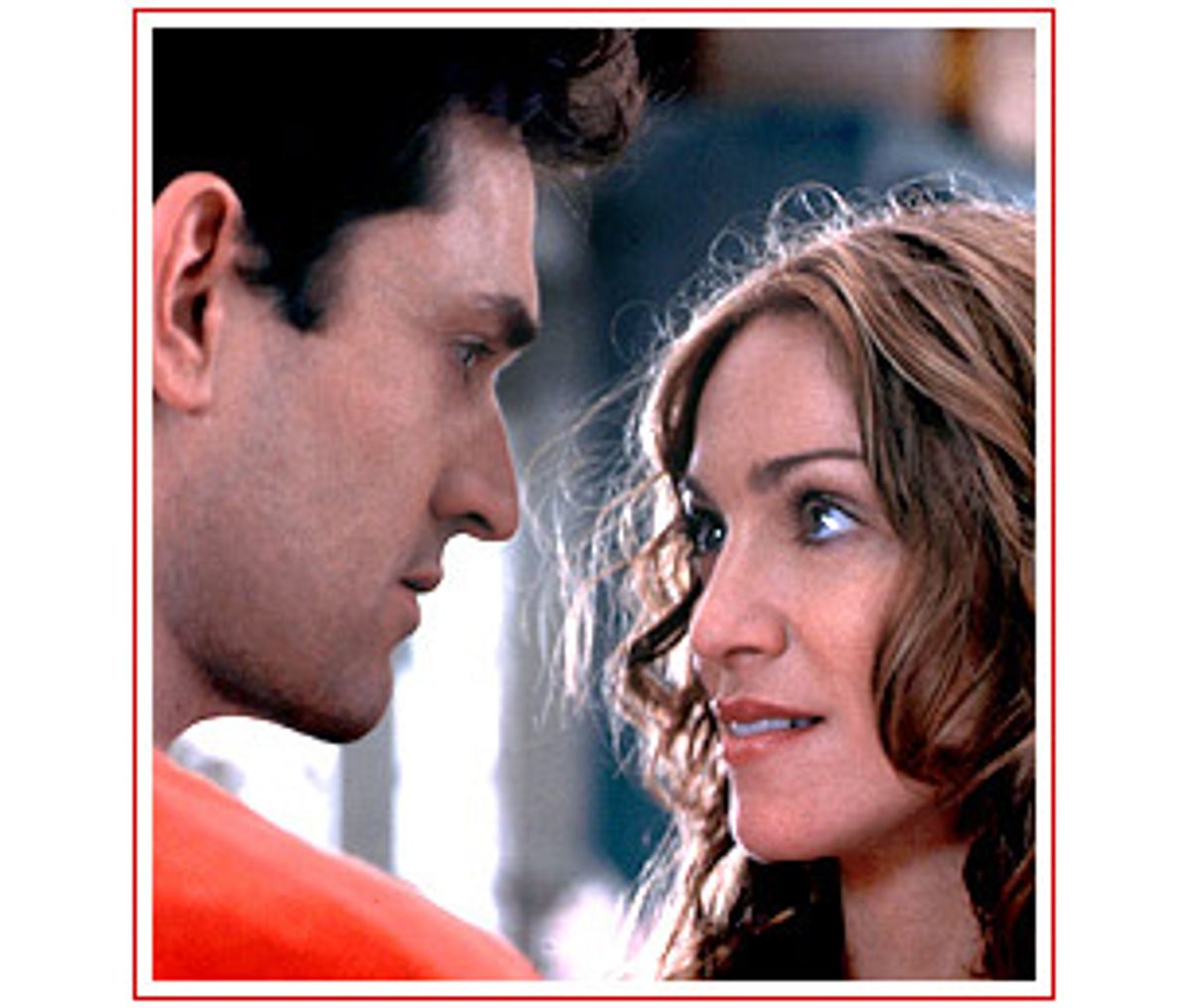There's nothing as frustrating as a
promising idea undone by a failure of
nerve. In John Schlesinger's "The Next
Best Thing," a single woman in her late
30s, played by Madonna, bears the child
of her best friend Robert (Rupert
Everett), who's gay, after a single
drunken assignation. The two decide to
raise the kid together, and the
arrangement seems perfect: Robert is a
remarkable father, Abbie a patient and
sensible mother. Their son, Sam (Malcolm
Stumpf), is bright, well-adjusted and
free of the brattiness that filmmakers so
often try to foist off as cuteness.
But alternative-family arrangements come
with their own set of problems: When
6-year-old Sam asks his dad why he
doesn't sleep in the same bed with his
mom, as his friends' parents do, Robert
tells him it's because she snores. It's
a funny, clever dodge, but we know as
well as Robert does that it's only
temporary.
The problem with "The Next
Best Thing" is that instead of wrestling
with some of the thorny, delicate
problems that might come up in such a
family, it struggles to manufacture and
hand over big, clumsy ones -- as if the
inherent drama (and comedy) in such a
socially unorthodox family could never
be enough to fuel a movie. "The Next
Best Thing" is two or more confused
films shoehorned into one, a picture
that spends its first half straining
against conventionality and its second
half bowing and scraping to it.
Madonna's charisma as a personality --
and even though it's dwindling rapidly,
I'm willing to believe she might still
have some left -- has never translated
particularly well to the big screen, and
"The Next Best Thing" doesn't do much to
help. Her role is conceived so that she
can pretty much play herself -- her
character is a yoga instructor with a
fondness for bindis and other eastern
trappings -- but perhaps she's changed
personas so many times that she can't
even pull that off. She seems wooden and
unnatural, and it's tough to watch,
because she's clearly trying her
damnedest.
Everett, conversely, in an effortless
and enjoyable performance, scoops up the
whole movie with one hand. He has a
charming rapport with his co-star,
spinning out offhandedly funny lines
like the one that begins, "If I were you
-- and I practically am ..." He plays a
landscaper, so we get the occasional
glimpse of him in rugged workwear, for
those inquiring minds who want to know;
he's beautiful to watch, and there's
both dignity and unabashed sexiness in
his presence. He plays a character, not
an orientation.
In many ways, his role
is carefully written: In the picture's
first half, when we see the easy, warm
relationship he has with his son,
there's no doubt that he's a nearly
perfect father. And there are lovely
touches that Everett plays beautifully:
Reading to Sam at one point, he turns
the book upside-down and makes up his
own ridiculous story involving a giant
purple booger that's enough to feed a
large family. It's just the sort of
silly gross-out that kids love, and it's
an especially appealing bit of goofiness
given Everett's unflappable smoothness.
But the story -- the screenplay was
written by Tom Ropelewski -- takes a
jarring spin at the movie's midpoint and
never recovers. It makes the movie feel
suddenly baffling, almost as if
Schlesinger, a veteran director with a
spotty record, simply didn't think to
guide us through the weird, inexplicable
tone shift. (And of his recent pictures,
at least, it would seem from the
charmingly eccentric "Cold Comfort Farm"
that he has some feel for delicacy of
tone.) When Abbie finally finds herself
a straight love interest -- an
investment banker who also happens to be
a pretty decent guy (Benjamin Bratt) --
Robert feels threatened in his role as
Sam's father. That's the point at which
the movie seems to be taken away from
Everett -- a serious mistake -- and
veers into "Kramer vs. Kramer"
territory. Abbie's character changes
overnight in a way that just doesn't
make sense; she behaves in a way that's
almost incomprehensibly cruel.
In its last half-hour, "The Next Best
Thing" hurtles toward high drama like a
runaway train, as if Schlesinger and
Ropelewski had decided that there wasn't
much to be said about alternative
families after all -- a weird choice and
a cowardly one, given that we live in a
country where gay marriages aren't
officially recognized and conventional
family units are still held up as a
prized ideal.
And "The Next Best Thing" deprives us of
some fairly essential pleasures: One
minute Abbie is about to give birth to
Sam; the next minute the action has
jumped bumblingly ahead to his sixth
year. We see her flipping through a
photo album, only briefly lingering on a
snapshot of Robert holding Sam as an
infant. Wouldn't it have been a good
idea to include at least a few scenes of
the couple adapting to life with their
new charge? I want to see Everett
reduced to a complete blathering idiot
in the presence of a tiny baby. As it
is, "The Next Best Thing" takes so many
wrong turns it's barely an also-ran. It
isn't the next best thing at all. Not
even close.

Shares